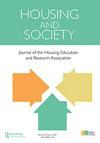Examining tenancy duration and exit patterns in a single-site, mixed-tenure Permanent Supportive Housing setting
Q2 Social Sciences
引用次数: 4
Abstract
ABSTRACT Permanent Supportive Housing (PSH) is recognized as an effective intervention for individuals who have experienced chronic homelessness. However, evidence of its efficacy mostly comes from scattered-site PSH. This paper investigates tenancy duration and exit patterns in a single-site, mixed-tenure PSH setting, drawing on nine years of tenancy administration data from a site in Melbourne, Australia. Our methodology combines survival and hazard analyses of tenancy records with analysis of exit reasons. We estimate that the probability of sustaining a tenancy to two years is 50% for supported tenancies and 46% for affordable tenancies. We find that of tenancies that exit, over two-thirds do so in unfavorable circumstances, and these tenancies are shorter than those that exit in favorable circumstances. We find some tenant attributes (including age and psychiatric disability) are predictors of longer tenancies, but tenancies started earlier in the site’s history were more likely to exit early. We argue that it is vital to acknowledge that people do exit PSH and to develop effective policy and practice responses to raise tenancy durations where practicable, and ensure that more people who leave do so in favorable circumstances.考察单址混合所有制永久性支持性住房的租期和退出模式
摘要永久性支持性住房(PSH)被认为是对长期无家可归者的有效干预。然而,其疗效的证据大多来自分散的PSH部位。本文利用澳大利亚墨尔本一个场地九年的租赁管理数据,调查了单一场地、混合保有权PSH环境中的租赁期限和退出模式。我们的方法将租赁记录的生存和危险分析与退出原因分析相结合。我们估计,对于支持租赁,维持租赁两年的可能性为50%,而对于经济适用租赁,则为46%。我们发现,在退出的租约中,超过三分之二的租约是在不利的情况下退出的,而且这些租约比那些在有利的情况下离开的租约更短。我们发现,一些租户属性(包括年龄和精神残疾)是长期租约的预测因素,但在网站历史上较早开始的租约更有可能提前退出。我们认为,重要的是要承认人们确实退出了PSH,并制定有效的政策和实践应对措施,在可行的情况下提高租赁期限,并确保更多的人在有利的情况下离开。
本文章由计算机程序翻译,如有差异,请以英文原文为准。
求助全文
约1分钟内获得全文
求助全文
来源期刊

Housing and Society
Social Sciences-Urban Studies
CiteScore
2.30
自引率
0.00%
发文量
10
期刊介绍:
Housing and Society is the journal of the Housing Education and Research Association (HERA). The journal supports the mission of HERA by providing for the dissemination of research and other scholarly work. Submissions from a broad range of perspectives are encouraged. Topics in housing include: policy, design, social aspects, gerontology, behavioral aspects, energy/environment, equipment, interiors, economics, theory/model development, education, and program development or evaluation. The journal welcomes the submission of original research articles, notes and commentaries. Notes are shorter manuscripts presenting succinct information on housing related to one of the following categories: - Research: exploratory or not heavily theory-based or statistically analyzed - Academic: innovative teaching ideas - Program: development, implementation, and/or evaluation of Cooperative Extension or other housing programming efforts - Policy: examination of policy impact, comparative analysis, and/or need to achieve housing goals - Reviews: books, documentaries, etc.
 求助内容:
求助内容: 应助结果提醒方式:
应助结果提醒方式:


